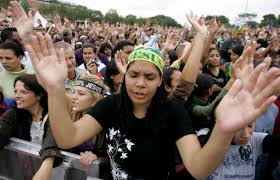
Brazil is a country of over 200 million people. The dominant religious group, Roman Catholics, are declining in numbers as the evangelicals have increased to over 20 percent of the population. The shifting religious landscape in a country known for its corruption and police brutality begins the conversation about religious hate crimes against Afro-Brazilian’s.
In the September 13, 2014, America Aljazeera article, Followers of Afro-Brazilian religions feel under attack, by Zoe Sullivan and Lyndia Borros, “In the wake of Brazil’s changing religious demographics, intimidation of and violence toward Candomblé and Umbanda worshippers have increased”. Both religions have a history of being ridiculed by Catholics. To avoid persecution, the African slaves in Brazil assumed Catholic saints as representatives of their own gods and goddesses. This is one reason the Candomblé religion is seen by Catholics as devil worship. Perhaps it is the evangelical movement that has had the most negative impact on practitioners of Afro-Brazilian religions.
With the rise in the evangelical movement and its main church leader, Edir Macedo, who has described the Afro-Brazilian religions as “diabolical,” prejudice continues. According to Forbes, the second-largest broadcaster Rede Record is owned by Macdeo; a resident of the United States and Telemundo affiliate owner in Atlanta. His church, Universal Church of the Kingdom of God, has over 8 million followers which perpetuates the intolerance. In his 1997 book, Orixas, Caboclos and False Gods or Demons, Macedo claimed Afro-Brazilian religion prohibited eternal salvation. More than three million copies were sold before it was ban in 2005 for its religious intolerance, according to a news report in Cotidiano.
Sullivan and Borros report, “In May a judge in Rio de Janeiro ruled that Candomblé and Umbanda were not religions. He was forced to retract that decision when it caused an uproar, but the sentence revealed that hostility to Afro-Brazilian religions permeates all levels of society”. However, this sentiment is wildly popular among the growing Evangelical politicians. Robert Muggah reports in his November 2, 2017, article, In Brazil religious gang leaders say they’re waging a holy war, “Evangelical lawmakers currently hold 85 of 513 seats in Brazil’s lower house of Congress, meaning that the religious right is shaping the national debate on gay rights, racial equality, women’s reproductive health, education and other social issues.” With the growing number of people being incarcerated and the influence of evangelicals converting drug lords in the overcrowded prisons, those living in the poorest areas of Brazil are being directly impacted.
Muggah continues to report that a few gang leaders in favelas across Rio are on a mission to “stamp out, one terreiro at a time” and to “cleanse the community” of Candomblé and Umbanda practitioners. According to Muggah, this attitude has escalated with “a small group of evangelical preachers in the favalelos and in the over-crowded prison system.” According to the Institute for Public Security 1,486 reported homicides in the state of Baixada Fluminese, the poorest township in Rio, has occurred so far in 2017. The impact of religious intolerance from religious leaders, to law breakers to everyday practitioners gives law-abiding evangelicals a bad reputation.
Brazil’s Constitution protects against hate speech but newly elected official are testing the limits of those protections. According to Monnerat in his article, Press freedom violations increase in Brazil by 65% in 2016, says Abert report, “Brazil remains one of the most dangerous countries in the world to work as a journalist.” Eight journalist were killed in 2015 and two were killed in 2016. Monnerat continues, “most of the aggressions generally come from public power, both in the form of police officers and security officers, as well as politicians and civil servants.” Judicial decisions, such as breach of telephone privacy, increased from 2 in 2015 to 18 in 2016. However, higher courts later corrected judges breach of freedom of expression. As Brazil works to improve the safety and unlawful conditions facing Brazilian journalist, work toward correcting religious intolerance continues.
To help combat this issue a newly formed Commission on Combating Religious Intolerance website was constructed to help educate the public about religious intolerance. An annual religious intolerance march on Copacabana beach has taken place since 2007 with over 50,000 marchers from many faiths participating this year. In Rio, a dedicated police station has been set up to help investigate religious hate crimes. According to Gandra’s, August 4, 2017 article, Rio will have specialized police station to combat racial crimes and intolerance, hate crimes have risen 119 percent since 2016. Efforts by the United Nations including the launch in January 2017, the report ‘Religious Intolerance in Brazil’ will be used to monitor and tackle discrimination. “Worldwide, there is a growing wave of intolerance and restrictions imposed on the exercise of the right to freedom of religion or belief,” said the Special Rapporteur on freedom of religion or belief, Ahmed Shaheed. Let’s hope that Brazil’s, International Decade for People of African Descent 2015-2024, will produce an end to Afro-Brazilian religious intolerance.
References
Gandra, A. (2017, August 4). Rio will have specialized police station to combat racial crimes and intolerance. Retrieved from http://agenciabrasil.ebc.com.br/direitos-humanos/noticia/2017-08/rio-tera-delegacia-especializada-para-combater-crimes-raciais-e
Judge suspends sale of book of Bishop Edir Macdeo. (2005, October 11). Cotidiano. Retrieved from http://www1.folha.uol.com.br/folha/cotidiano/ult95u115122.shtml
Monnerat, A. (2017, February 22). Press freedom violations increase in Brazil by 65% in 2016, says Abert report. University of Texas at Austin, Knight Center for Journalism in the Americas. Retrieved from https://knightcenter.utexas.edu/blog/00-18048-violence-against-journalists-brazil-increased-65-2016-says-abert-report
Muggah, R. (2017, November 2). In Brazil religious gang leaders say they’re waging a holy war. Retrieved from https://theconversation.com/in-brazil-religious-gang-leaders-say-theyre-waging-a-holy-war-86097
Profile, Edir Macedo & Family. (2017). Forbes. Retrieved from https://www.forbes.com/profile/edir-macedo/
Sullivan, Z. & Borros, L. (2014, September 13). Followers of Afro-Brazilian religions feel under attack. Retrieved from http://america.aljazeera.com/articles/2014/9/13/prejudice-againstcandombleworshippersincreasesinbrazil.html